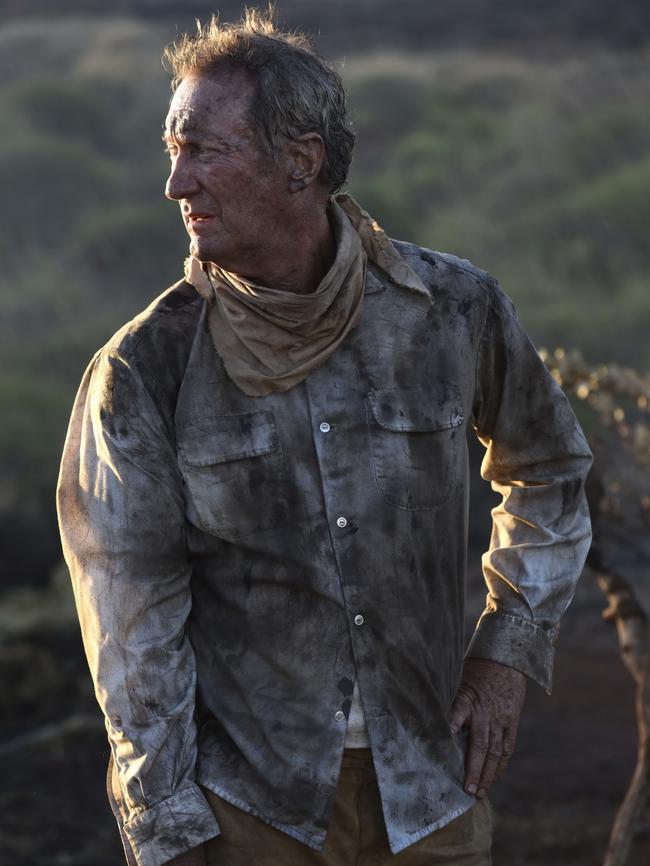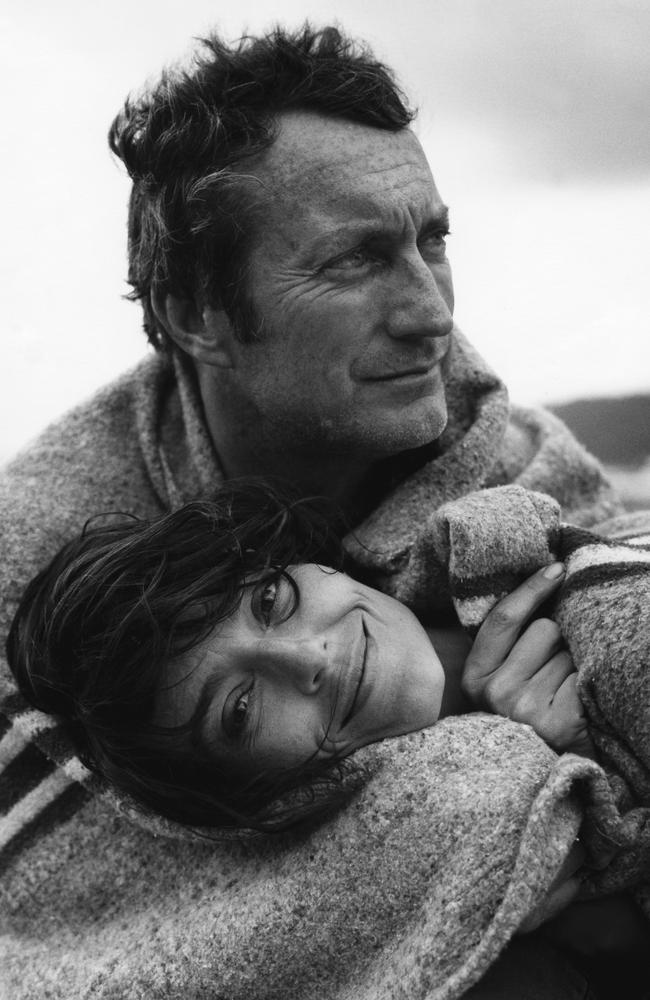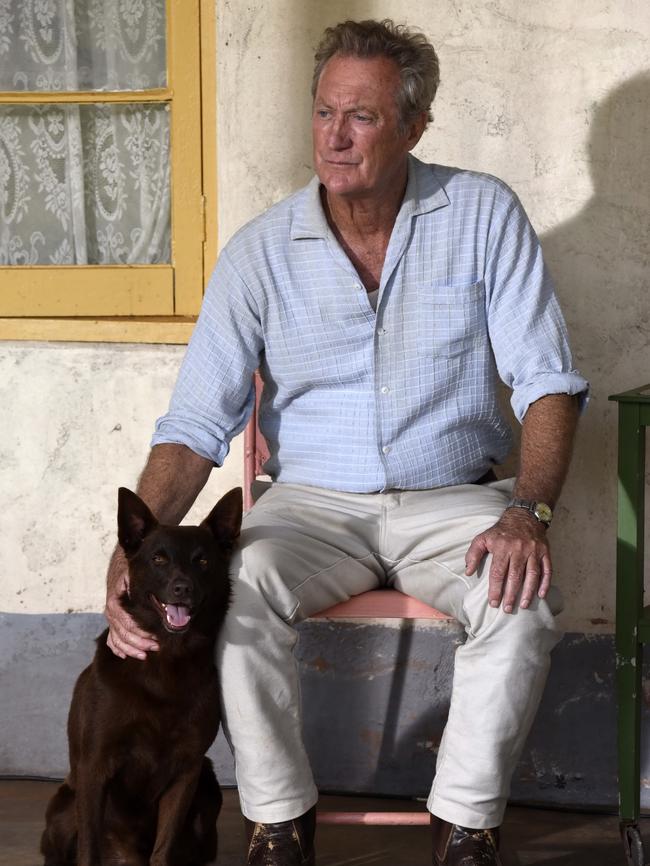Bryan Brown on why Australian men don’t cry
ADEPT at portraying the quintessential Aussie male, acting legend Bryan Brown believes his fellow countrymen are emotional — they just don’t show it.
HE’S the quintessential Aussie character, so it’s no surprise Bryan Brown is one of the stars of the Red Dog: True Blue sequel. Here, he opens up about portraying masculinity and being one of the veterans of the Australian film industry.
THERE’S an old saying that actors should never work with children and animals. Did your co-stars in your new film Red Dog: True Blue steal the show?
I love working with children and animals. I did a miniseries called The Shiralee, which was about a man trudging through the outback with his daughter, and I loved it. I love working with children because they’re so honest with how they perform — I’d say, work with children and animals and try to give up on the adults.

Your character says, “I’m a stubborn man on a hard land.” You often seem to be cast as this quintessential Aussie male. Why do you think that is?
There are plenty of types of men. I think people in the outback, they have to grin and bear it, hang in there and be stubborn — “No, I’m not leaving the farm, even though we’ve just had a cyclone and a flood and fires. I want to be on the land, I will stay here through hell or high water.” They’re game buggers. Australia’s a harsh continent and the people that first came here — I don’t mean our indigenous people, who knew how to live here for 50,000 years — when us mob, the wrong mob, all blonde and bloody freckles, came to this harsh environment, often against their will, knowing they were never going to see their families again, they had to become pretty tough and pretty hardened people. That sort of stubborn characteristic probably does define us in a mythical way. In the main, Australian men are very emotional, but they don’t show it — I like playing those sorts of characters because there’s a lot going on. Some of them have killed a few people, which I like. And some of them have kissed a few girls and I like that, too.
I still find it exciting to play an Australian
Which is more fun, killing or kissing?
I’m going to be an idiot to say killing, aren’t I?
Your wife, Rachel Ward, who’s directed you in two films, once described you as “a pain in the arse” to work with. Are you?
Yeah, probably, because I ask a lot of questions and she was like, “Can you just get on and do it?” No, because I want to know why! To her, I was taking her fun away. She’s the boss, she’s the one making the movie, so I should shut up and just do it. But I was going to give her the same problems I give every director. I’m not tricky, I just need answers.
Your daughter, Matilda, has followed you into the family industry. How was working with her on her TV show Let’s Talk About?
Matilda writes, acts and directs and she’s just finishing off the second series for Presto. We get on much better working together than we do being father and daughter, because as father and daughter, she snaps at me, but when I’m actor and producer and she’s writer and director, she’s really nice to me. I do enjoy my creative relationship with her enormously. I’m blown away by how clever she is as a director, writer and actor — and she writes me very good parts!

Is she similar to you and Rachel?
She’s definitely one of those old souls. She’s always been inquisitive and needs to find out the absolute honest answer to something. This honesty through her creativity, that ain’t necessarily from me or Rachel. We come from other areas, Rachel visually and me more emotionally.
You’ve got this rare overview of the Australian film industry, having worked in it for almost 40 years. Can you look back on your highlights?
In the 1970s, it was such a buzz to be part of that Australian film resurgence. You had Australian footballers, you had swimmers, you had tennis players but you didn’t have Australian actors on screen — and suddenly we did. We were rolling into different country towns, different states to make movies. It was like seeing gunslingers walking into somewhere — it was pretty buzzy, let me tell you. And we made movies that everyone took note of. It was pretty great.
I was working in insurance at AMP and I found it terribly claustrophobic
Which stick out in your memory?
Breaker Morant gave me an entree to working all over the world, so I’m incredibly grateful to that, as did A Town Like Alice. Movies like Newsfront were highly regarded in Cannes. Now I think actors are used to the idea that we make television and films, but back then it was pretty spectacular to be able to film as an Australian. You didn’t have to put on an American or British accent — you could play someone you completely understood, whether it be a bloke from Dubbo or Brisbane or from Bankstown or Perth. That was massively exciting. I still find it exciting to stand in front of a camera to play an Australian.

Somebody once wrote, “Life has only three constants: death, taxes and Bryan Brown.” How does it feel to be a national treasure?
That’s very funny; that’s a hell of a compliment. I wouldn’t think I’m a national treasure — I think I’m becoming an old rock, still around because they haven’t kicked me off the planet yet.
Is there still anything you want to achieve in your career?
That’s a reasonable question, but the strange thing is I’ve never sought a career. I’ve sought a life and I became an actor to have that life. I was working in insurance at AMP and I found it terribly claustrophobic. I had to leave because I didn’t find I could have a life that way, it wasn’t going to be fulfilling. I went in search of something and I’ve been incredibly lucky that what I sought, I found. So I’ve never really had a goal. I wanted to be an actor and I became one — and it’s taken me to every corner of the earth, and it’s allowed me to tell stories, which is the best fun in the world.
Red Dog: True Blue is in cinemas on Dec 26.
Originally published as Bryan Brown on why Australian men don’t cry
